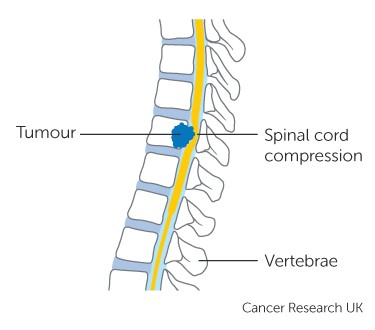Spinal cord compression
Spinal cord compression is caused by any condition that places pressure on the bundle of nerves in your spine (called the spinal cord).
What is spinal cord compression?
Spinal cord compression is caused by any condition that places pressure on the bundle of nerves in your spine (called the spinal cord). This can stop the nerves working properly that control different parts of your body, such as your arms, legs, bladder, bowel and sexual organs.
Spinal cord compression can happen if you have cancer in your spine. For example, if cancer started in your spine, or if another types of cancer has spread to your bones.
It can also be caused by injury or bleeding around the spinal cord.

Picture courtesy of Cancer Research UK / Wikimedia Commons
What are the symptoms?
- Weakness, tingling (pins/needles) or numbness in your arms, legs or body
- A band of pain in your back, neck arms, legs or body
- Unsteadiness on your feet or your foot going from under you
- Difficulty using your arms or legs
- Losing control over your bowels or bladder or finding it hard to go to the toilet
- Pain that moves down your legs or arms
- ‘Foot drop’ - weakness in your foot that makes it difficult to walk
- Difficulty getting an erection
What should I do if I have symptoms?
Spinal cord compression is a medical emergency. It’s important to get treatment quickly if you have symptoms, to avoid the nerves being damaged permanently.
If you notice any symptoms, contact your hospital team or go to the emergency department straight away and tell them that you have cancer and you are worried that it might be spinal cord compression.
How is spinal cord compression treated?
You should have an MRI scan to diagnose spinal cord compression. It’s important to start treatment as soon as possible to try to avoid permanent damage to the spinal cord. You may have treatments:
- To relieve the pressure on the spinal cord and try to prevent further damage.
- To help with any symptoms. For example, painkillers if you have pain, or blood thinning drugs if you’re not moving about which can increase your risk of blood clots.
- Steroids can reduce swelling to reduce the pressure on the spinal cord. They are usually given as tablets or as a drip into your bloodstream.
- Radiotherapy can reduce the size of the cancer to relieve pressure and reduce pain.
- Surgery to remove the tumour and any bone pressing on the spinal cord can help to relieve pressure. Or you may have steel rods or bone cement put into your spine to strengthen it.
Physiotherapy
- You may get advice from a physiotherapist to prevent damage to your spinal cord. For example, you may need to lie flat for a time to keep your spine as still as possible. The physiotherapist can also advise you on how to move around or give you a collar or brace to protect your spine.
- Drugs such as bisphosphonates can strengthen the bones in the spine. They can also help to control pain.



Talk to a Cancer Nurse

Support Line
Our Daffodil Centres

